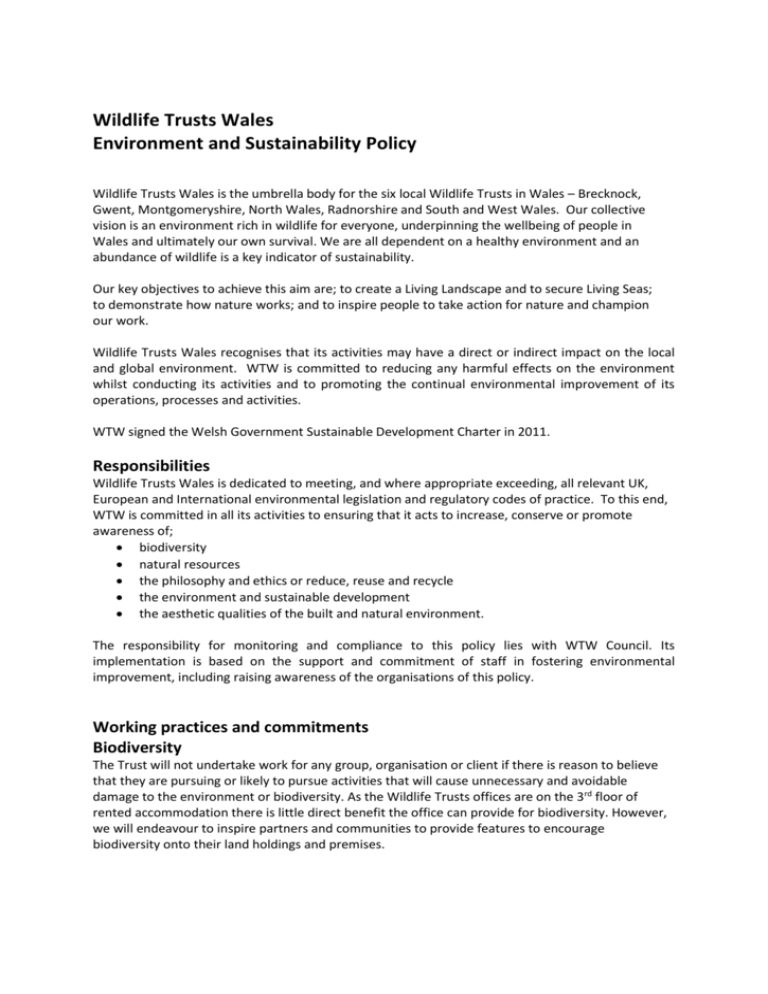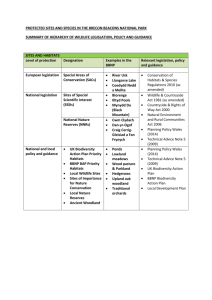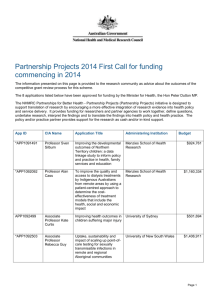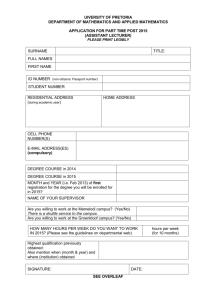Wildlife Trusts Wales Environment and Sustainability Policy
advertisement

Wildlife Trusts Wales Environment and Sustainability Policy Wildlife Trusts Wales is the umbrella body for the six local Wildlife Trusts in Wales – Brecknock, Gwent, Montgomeryshire, North Wales, Radnorshire and South and West Wales. Our collective vision is an environment rich in wildlife for everyone, underpinning the wellbeing of people in Wales and ultimately our own survival. We are all dependent on a healthy environment and an abundance of wildlife is a key indicator of sustainability. Our key objectives to achieve this aim are; to create a Living Landscape and to secure Living Seas; to demonstrate how nature works; and to inspire people to take action for nature and champion our work. Wildlife Trusts Wales recognises that its activities may have a direct or indirect impact on the local and global environment. WTW is committed to reducing any harmful effects on the environment whilst conducting its activities and to promoting the continual environmental improvement of its operations, processes and activities. WTW signed the Welsh Government Sustainable Development Charter in 2011. Responsibilities Wildlife Trusts Wales is dedicated to meeting, and where appropriate exceeding, all relevant UK, European and International environmental legislation and regulatory codes of practice. To this end, WTW is committed in all its activities to ensuring that it acts to increase, conserve or promote awareness of; biodiversity natural resources the philosophy and ethics or reduce, reuse and recycle the environment and sustainable development the aesthetic qualities of the built and natural environment. The responsibility for monitoring and compliance to this policy lies with WTW Council. Its implementation is based on the support and commitment of staff in fostering environmental improvement, including raising awareness of the organisations of this policy. Working practices and commitments Biodiversity The Trust will not undertake work for any group, organisation or client if there is reason to believe that they are pursuing or likely to pursue activities that will cause unnecessary and avoidable damage to the environment or biodiversity. As the Wildlife Trusts offices are on the 3rd floor of rented accommodation there is little direct benefit the office can provide for biodiversity. However, we will endeavour to inspire partners and communities to provide features to encourage biodiversity onto their land holdings and premises. Transport All staff will be encouraged to use more sustainable forms of transport to meetings away from Baltic House, including public transport, cycle or walk. Aiming towards a year on year reduction in mileage. Where possible travel by air should be avoid unless there are time constraints or danger of not being compliant with WTW travel by car policy i.e the travel time would be too excessive. Advice should be sort from WTW CEO before booking any air travel. To reduce the need to travel WTW will seek to use the most resource efficient technologies and media for communicating. Waste and recycling The Trust will adopt a basic strategy of reduce, re-use and recycle. We will comply with recycling standards at Baltic House and encourage reduction of waste and recycling when at meetings, conferences or events away from the office. Consider re-using material before procurement, but where necessary all procurement will take into account need to buy recycled products. Procurement Review the purchasing policy of the office and the environmental effects of the design, packaging and distribution, use and disposal of all products and activities so that we can minimise the negative environmental effects that results from our operations. Energy and water saving Being in rented offices means that there are limitations for Wildlife Trusts Wales to influence energy use, reduction of water in flushing toilets etc. However the Trust engages with landlords to suggest any improvements and aims to keep energy and water use to a minimum through other means. Review and monitoring The policy will be subject to annual review and will be communicated regularly to all staff, trustees and made available to all interested parties. Policy Objective Biodiversity Promote environmental management policies and practices at every level and in every area of the Trusts activities. Enable partners or communities we come into contact with to increase their awareness and understanding of environmental issues, and to acquire skills to increase biodiversity and/or for environmentally responsible behaviour and Action Point Review this policy annual and aim to improve performance annually Promote events, conference and training opportunities through WTW website and social media. action. Participate with other local/national organisations to promote environmental credentials Use the most resource efficient technologies and media for communicating Transport All staff will be encouraged to use more sustainable forms of transport Ensure any vehicle purchases take environmental performance into account To reduce waste generated by WTW by 10% by 2015 Waste reduction Target around 90% recycled products purchased Purchasing decisions ensure environmental impacts are considered as well as price. Endeavour to use suppliers of goods and Procurement services that seek to minimise their environmental impact Energy and water saving Reduce use of electricity and water at the office and at events, through monitoring of use and annual review Investigate potential environmental accreditation for WTW. Promote Biodiversity Benchmark to partners. Teleconference facilities at Baltic House and use of Skype where possible Aim to reduce fuel consumption by vehicle sharing, combining journeys and planning. Promote cycling through having accessible cycle route maps, provision of safe bike storage, cycle to work days When purchasing buy most sustainable form of transport Provide recycling bins for paper, plastic, tins, glass and food waste. Purchase recycled products where available. Paper (office use and printed publications) should be from recycled or FSC materials. Identify opportunities to borrow or share resources rather than purchasing new. Re-use resources in office, such as paper (for memos), envelopes etc. Avoid purchasing disposable items such as plastic plates, cutlery, cups. Buy reusable/, refillable/recyclable products. Equipment/materials should be offered to other organisations instead of disposed of when no longer needed. Use natural resources prudently - Timber must be from sustainable (managed) forests and locally produced where possible, no peat or peat-based products, food should be local and sustainably produced. Plants/trees should be native/wildlife friendly Use biodegradable or environmentally safe chemicals and cleaning products Purchases will be from locally manufactured or available products /services where available or fairtrade All new electrical items to be purchased on basis of their energy efficiency where possible Turn off computers, printers, etc when not in use. These items must not be kept on standby. Lights should be switched off at the end of the day. Use electrical equipment efficiently and avoid use of heaters and fans in preference to opening windows/adjusting radiators. Report leaky taps, pipes and toilets to landlord immediately








